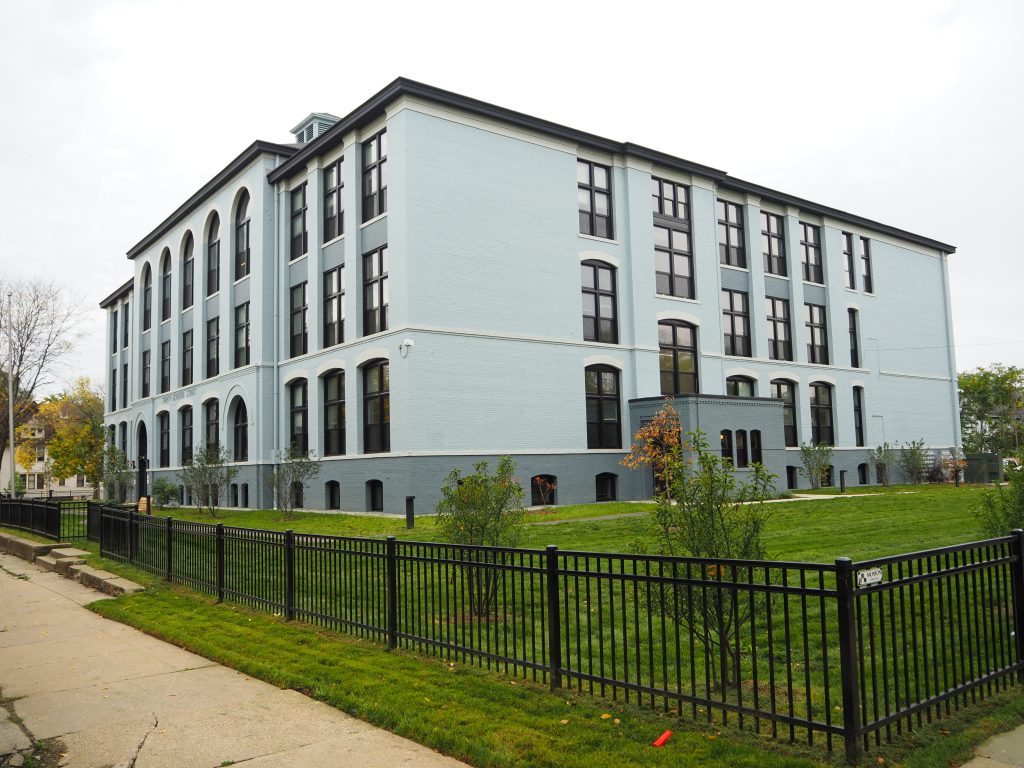Anti-Displacement Policy Sees Slow Start
But city program to keep renters in their neighborhoods by setting aside new apartments is growing.
The City of Milwaukee adopted an anti-displacement policy in 2019 for new development in targeted neighborhoods, but the first buildings subject to the policy only opened this fall.
Forty rental units across three developments are subject to the policy, but only two of those developments have been completed: THIRTEEN31 Place and 37th Street School. Ribbon cutting ceremonies were held for both developments in October. A third project, ThriveOn King, has seen its groundbreaking delayed for more than a year.
“The demand for units is very high, they usually have long waiting lists” said Department of City Development planning manager Sam Leichtling of the existing demand for affordable units. He presented a report on the policy to the Zoning, Neighborhoods & Development Committee on November 16.
But the anti-displacement policy only applies to select areas.
“Preference policies across the country are very complex,” said the planning manager. To create the city policy, statistical testing by ZIP code was done to determine there would not be a disparate impact based on race or national origin. A disparate impact analysis was created and published. Leichtling credited DCD graduate intern Isabel Gunderson for completing much of that analysis.
It applies to new city-supported affordable housing developments in the 53204, 53208, 53212 and 53233 ZIP codes where a statistical analysis determined residents were at risk of displacement. “Basically the areas just north, west and south of Downtown,” said Leichtling. But the boundaries actually stretch much further, north to the city limits, west to the Wauwatosa border and south to W. Becher St.
The policy was created as a result of the 2018 Anti-Displacement Plan, which has the goal of preserving existing affordable housing and creating new affordable housing in neighborhoods at risk of displacement.
“We have done a number of things to advance that goal,” said Leichtling. He said DCD has increasingly backed the use of tax incremental financing to fill financing gaps in affordable housing proposals.
Known formally as the “Anti-Displacement Neighborhood Preference Policy,” the policy effectively piggybacks on other affordable housing efforts. It is intended to complement the existing low-income housing tax credit program and its per-project duration lasts as long as the underlying affordable housing financing mechanism.
“The individuals benefitting from the projects are still going to have to be low-income individuals,” said Leichtling. “It’s not like a wealthy household is going to benefit.”
“I think we are really proud in the two and a half years since this policy was created… you now have eight projects moving forward,” said Leichtling.
A pilot phase was scheduled to last through the end of 2021. The Common Council reauthorized the program on a permanent basis on November 23. The policy is sponsored by council members Russell W. Stamper, II, Jose G. Perez and Milele A. Coggs.
The new policy requires DCD to report on its progress by the end of 2023 and conduct a new disparity analysis. Affected developments are also required to report on their leasing progress.
The 2018 anti-displacement plan also led to the creation of a privately-run anti-displacement fund that subsidizes property tax payments for low-income, long-term homeowners in select areas.
If you think stories like this are important, become a member of Urban Milwaukee and help support real, independent journalism. Plus you get some cool added benefits.
Eyes on Milwaukee
-
Church, Cupid Partner On Affordable Housing
 Dec 4th, 2023 by Jeramey Jannene
Dec 4th, 2023 by Jeramey Jannene
-
Downtown Building Sells For Nearly Twice Its Assessed Value
 Nov 12th, 2023 by Jeramey Jannene
Nov 12th, 2023 by Jeramey Jannene
-
Immigration Office Moving To 310W Building
 Oct 25th, 2023 by Jeramey Jannene
Oct 25th, 2023 by Jeramey Jannene






















